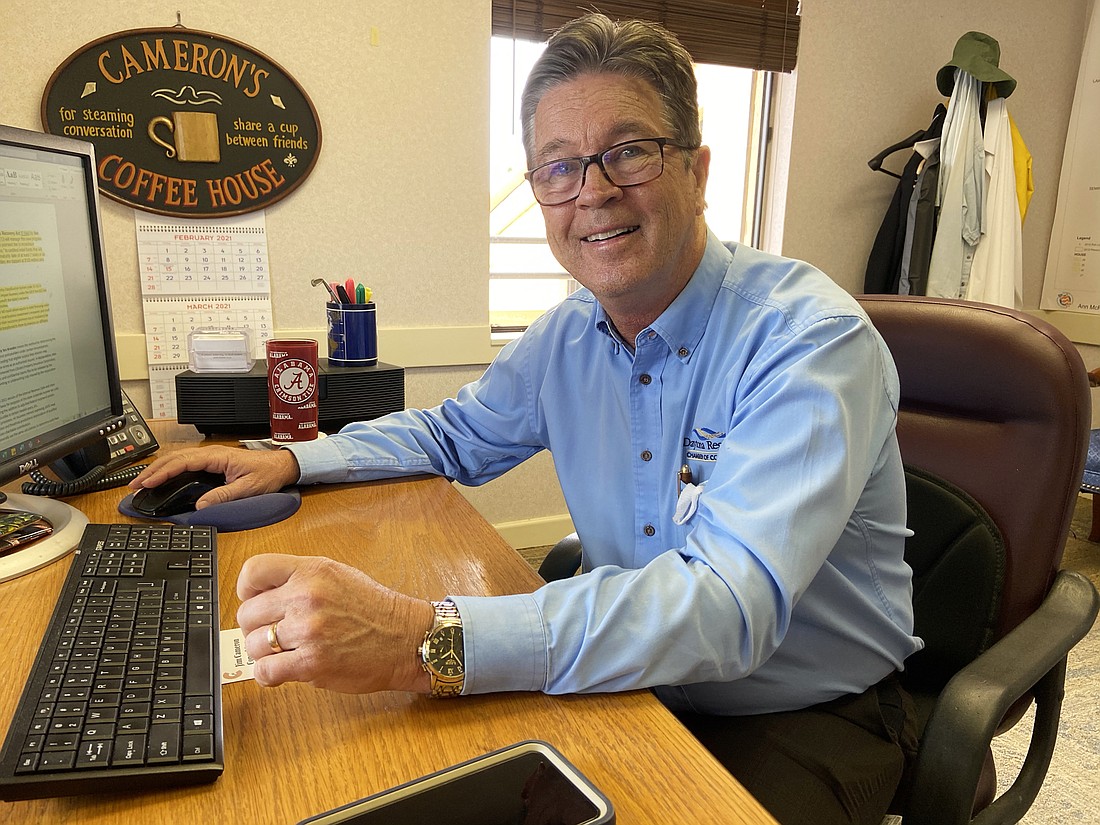- January 27, 2025
-
-
Loading

Loading

Jim Cameron is best known in the community for a couple things: Facilitating lobbying activities for Volusia County officials, and his unconditional love for the University of Alabama football team.
Cameron, the senior vice president of government relations for the Daytona Regional Chamber of Commerce, will be retiring from his position at the end of April after spending nearly four decades with the chamber. An Alabama native, Cameron had never lived outside his home state until he moved to Daytona Beach in 1983. Upon his retirement, he will remain active in the community as a government relations consultant.
He never expected to spend 38 years with the chamber.
"I think the thing that made the difference was the people that I got to know down here — elected officials and the community in general — were so nice," Cameron said. "I enjoyed the issues, the work and all back in the day, and still do. I think that’s why I was here all these years. The people."
The Ormond Beach Observer spoke with Cameron about his work with the chamber and the political issues he's witnessed over the last 28 years on Thursday, April 22.
Some have changed. Some have not. Some of the things we’re still talking about today are things we talked about in the 1980s. Like say infrastructure issues, tourism issues, things along those lines.
Some new things that are on the horizon now that you’d never heard tell of as it relates to back in the 80s or 90s for that matter, are technology type issues.
1985. We had a maneuver to try to consolidate all the cities here in east Volusia. It didn’t pass, and there were some very strong arguments for and against. I was a staff person in support of that consolidation effort. That was my first big issue when I moved down here.
It failed Oct. 15, 1985, but what it did do was it got the cities to talking more so and had them make more of an effort to work together on some of these issues that affect us as a whole. Some of those things led to the consolidated beach approaches. The next year, 1986, we had Volusia County beaches come under the auspice of the Volusia County Council.
Another one was the Coastal Construction Control Line legislation That’s going to help more so as far as construction on the east side of A1A. That was a tough bill to get through the legislature [around 1999].
Also in 2009, we got school funding. That was a major concern back in the time. That was a rough year as far as just getting the needed education dollars and all, and we took a campaign to Tallahassee for that.
2015 — County council approved the oceanfront construction beach driving compromise, which led to the Hard Rock Hotel.
I’d say SunRail because at the time, County Council Chair Frank Bruno and I, we made a lot of trips around here in Central Florida, back and forth to Orlando. Then we went to Tallahassee numerous times and all, and we thought that was it, when it passed the legislature and all, and then Gov. Rick Scott wanted to review it again and there were some hearings that were held by the transportation secretary first part of 2010. We had a big crowd in support of SunRail. Then Rick Scott went ahead and signed on in support.
It’s a long-range type issue. Probably after I’m dead and gone, people would look back and think, "Wow, this is something that we’ve been needing. Thank goodness we’ve got it.”
[Also,] chairing the Volusia Days at the Capitol for 19 years. This helped connect Volusia's business community with our state leaders in Tallahassee.
One, business liability protection as it relates to COVID-19 cases. That’s something that businesses were struggling with all last year. Thank goodness that we got the ppe loans, just to try to try to get customers and keep their doors open, but then you have the threat of a lawsuit at the same time on top of that. We’re just very much glad that legislation was approved.
Now, something we’ve sought since 2007 is online sales tax. They passed that last week, and that’s going to bring about a billion dollars of new revenue into the state, and it’s not a new tax by any means. It’s a tax that’s already on the books, it’s just now it’s going to be enforced.
There were some differences between what the business community wanted and what the residents here wanted. Something that I’m proud of is I made a phone call to a residential leader and said, "Look, this animosity, we’ve got to put it aside." So we had a meeting downtown in a coffee shop. That was probably around 2016, I think it was.
The residents — they’ve got a legitimate viewpoint. They want a vibrant city, but then they want things where the city is livable. The business community wants those same things. We just saw them through, I guess, a different pair of glasses. What we did, and a lot of this focused in the core tourist district, and as a result of that coffee shop meeting, we had several [more meetings]. We still disagree on paper with one another on several things, but we’re willing to talk about it. We have to agree to disagree, but there is a willingness to work with both groups, and there’s respect between both sides.
Next question. [Laughs]
We want them both. Equally.